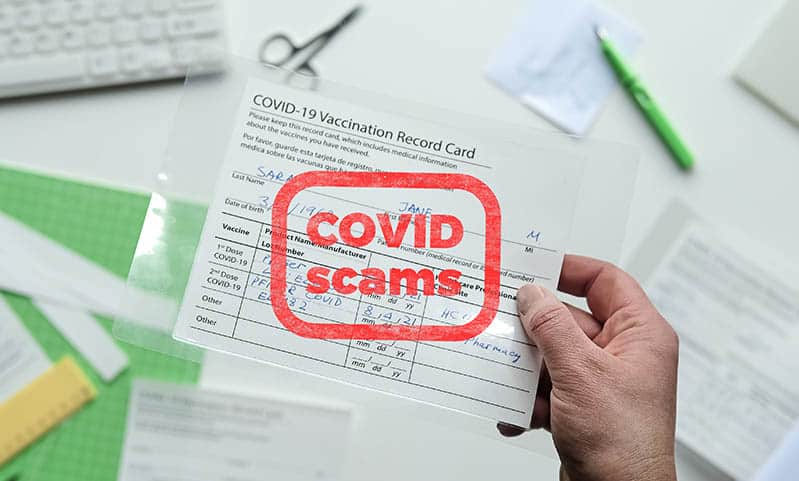A CVS employee is in hot water after he allegedly swiped some sixty COVID-19 vaccination cards.
He planned to sell some of them and “share them with family members and friends, so that they could go into venues and possibly even use them at schools.”
This arrest is a sign of a growing trend. Authorities in several states have made similar arrests over similar fake vaccine card scams.
A few companies, like eBay and Twitter, have taken steps to stop online sales. But fake cards are still available in a number of places.
“You can’t have scams like this occurring,” Nassau County Police Commissioner Patrick Ryder said about the Long Island CVS arrest.
“The idea of getting us all back to normal is that when you walk into a place and they’re requiring that card, you want to make sure that card is factual.”
Protecting Your Healthcare Information
Black markets which did not exist six months ago, for things like altered vaccination cards, are booming.
Nevertheless, the same basic rules still apply for protecting PII (Personal Identifying Information), like the date of birth on a vaccination card. Providers have a responsibility to protect this information, and so do you.
Doctors’ offices, clinics, hospitals, and other healthcare organizations must protect your privacy. Usually, this duty involves sensitive medical diagnosis information.
Frequently, it also involves PII, such as:
- Date of birth,
- Social Security number,
- Address,
- Drivers’ license number,
- Telephone number, and
- Email address.
Pretty much every medical record has at least some of this information. Unauthorized exposure could significantly affect your privacy.
Therefore, providers must usually keep such information under lock and key, either physically or virtually.
Now, let’s talk about some ways you can protect your personal information.
Most data breaches don’t involve hacks or other unauthorized access. Accidental exposure is the biggest problem.
Someone leaves a laptop open or forgets to unplug a thumb drive from a public computer.
The same thing is true of inadvertent personal exposure, and coronavirus vaccine cards are a good example.
These cards include your date of birth. So, it’s usually a bad idea to post vaccination selfies online. But at the same time, it’s a good idea to digitally record your card.
Consider taking a good picture of your card for personal use and obscuring the PII for the one you put on Instagram.
Can I Trust Companies with My Personal Data?
As mentioned, healthcare providers have a legal duty to protect your information. If they breach that duty, and that breach causes actual injury, a New York personal injury attorney can stand up for your rights in court.
Actual injury is usually the issue with the aforementioned PII.
Yes, it’s unsettling to know that strangers know where you live. But bad feelings normally don’t hold up in court.
The same thing applies in a car wreck claim. If a driver swerves at you and almost hits you, a negligence claim is usually unavailable.
Personal financial information, like bank account numbers and credit card numbers, are different. If this data leaks out, the results could be devastating.
Therefore, the law imposes a higher standard of care. Limited access or a privacy lock is not enough.
Banks, hospitals, lawyers, and anyone else with such data must take extra steps to protect it. Usually, such measures include strict BYOD (Bring Your Own Device) restrictions to eliminate accidental exposure, and multilayer security to prevent malicious breaches.
If an intentional or unintentional data breach causes injury, damages usually include compensation for economic losses, such as stolen money, and noneconomic losses, such as pain and suffering.
These resolutions usually also include consent decrees. Companies must provide credit history protection or take other measures to adequately protect consumers.
When it comes to protecting your personal information, “trust but verify” is a good rule of thumb. For a free consultation with an experienced personal injury lawyer in New York, contact Napoli Shkolnik PLLC.
